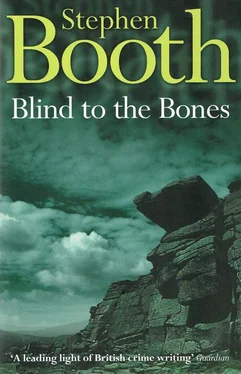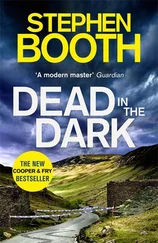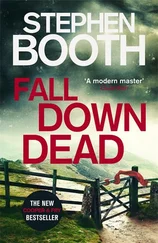Fry looked closer, searching the map for features she could recognize. Some of the moors had their own names — she saw Dead Edge Flat, Bleakmires and Withens Moss. She could make out the line of a disused railway tunnel running under the hills. But the moors themselves were empty.
Then she laughed. Not quite empty. There were actually some features to be found marked among the brown contour lines and the tangled systems of cloughs and slacks. The features were labelled on the map as ‘mound’ and ‘pile of stones’.
‘Unbelievable,’ she said.
But Murfin just smiled.
The Renshaws’ sitting room was almost colourless. There were no reds or blues in the décor or in the furniture, only shades of brown, cream and off-white, as if the life had been bleached from the house. Diane Fry wondered if it had always been like this, or whether the Renshaws had changed the look of the house since Emma had disappeared, consciously or unconsciously reflecting the draining of the colour from their own lives.
Sarah Renshaw showed Fry and Murfin into the room and made them sit together on the leather settee. Murfin sat down gingerly, trying not to touch the teddy bear that sat at the end of the sofa, against the arm. It was about eighteen inches tall, and it had a red ribbon tied round its throat. Its eyes stared glassily at the Japanese screen in front of the fireplace, and one of its arms was raised as if to take an invisible cup of tea.
Despite the washed-out look of the room, Sarah Renshaw seemed to gain vitality from the moment she was given a chance to talk about Emma. It was the one aspect of her life that seemed to mean anything at all to her now. That, and the endless analysis of her own guilty feelings.
‘We can still sense Emma in the house,’ said Sarah. ‘Can’t you?’
‘No, I’m sorry. But I never knew her.’
‘The house is full of all the things that mean a lot to Emma. Her books, her drawings, and her poems. Her violin and her paints. And, of course, her teddy bears.’
‘Teddy bears?’
‘Yes. Emma was starting a collection. We gave her a big eighteenth birthday party here, you know. It was a wonderful party, with all her friends, and a disco and everything. Emma said it was the best day of her life.’
Sarah Renshaw’s voice died, and her thoughts seemed to drift away for a moment. Fry could almost see the little black fist of reality that was trying to break through her bubble in those few seconds. It hammered, but failed to get in. Fry felt her throat constrict, and experienced a brief pain in the exact spot where the surgeon had left a small, fleshy vestige of her tonsils when he removed them years ago.
But then Sarah recovered herself and was just as composed as before, smiling at Fry as if she had made some small social gaffe.
‘Anyway, Emma was starting a collection of teddy bears,’ she said, ‘and lots of people brought her teddies for her collection on her birthday. Most of them are in her room upstairs, but we keep her favourite ones down here. Edgar there was her very first one, and he’s rather special. We gave him to Emma ourselves. He’s sitting there waiting for her to come home.’
Murfin looked at the teddy bear on the settee, and tried to edge further away from it. But he found himself nudging up against Fry. She gave him a look, and he edged back again, his trousers squeaking on the soft leather.
‘You know,’ said Sarah, ‘every morning when I wake up, there’s a moment when I feel like my old self again. It’s a wonderful moment, when Emma is about to arrive home, just as she was that day two years ago. And for a brief time it feels as though nothing was ever wrong at all. I always try to cling on to that moment and bring it into the world with me as I come awake. If only I could manage to hang on to it for long enough, I could make it real. But I’ve never been able to do it. Every time, the moment slips away from me.’
Sarah sighed, and looked up at something above Fry’s head.
‘Then I open my eyes, and everything falls back into perspective. And suddenly two years have gone by, and here I am. Here, today. My new self takes over again.’
Howard had pulled up another armchair to be near her. He leaned over and touched her shoulder.
‘She’ll be back soon,’ he said.
But Sarah didn’t seem to notice him or feel his touch. ‘I always keep Emma’s clock going in her bedroom,’ she said. ‘I make sure I replace the batteries regularly. It’s important that the clock shouldn’t stop. As long as it’s ticking, it’s counting down the minutes until Emma comes home. It mustn’t stop, until then.’
‘Mrs Renshaw, when Emma went missing—’ said Fry.
‘When she didn’t come home,’ Sarah corrected her gently. But she had a resigned note in her voice that suggested she had said it often before, had said it too many times to too many people.
‘When she didn’t come home,’ said Fry, ‘you said you spoke to all her friends.’
‘Yes, of course we did.’
‘By that, do you mean the young people she shared the house with?’
‘Yes, and a few others, such as some of the girls she knew on the same course.’
‘Was that before or after the local police had spoken to them?’
‘Before,’ said Howard. ‘If they bothered to speak to them at all, that is.’
‘The West Midlands officers went through the correct procedures at the time, Mr Renshaw.’
‘I suppose you have to say that. You have to stick together.’
‘They’ve sent us copies of all their reports. I read through them yesterday.’
‘A journalist on one of the local newspapers told us nine months ago that the police had arrested a man for attacks on two other female students in the area around the same time,’ said Howard.
‘Yes, I’m aware of that.’
‘He told us that the police had tried to make out a case that this man had done something to Emma, too. He said they had no evidence, but they were connecting it. “Tying it in,” he said.’
‘Yes.’
‘I think they’ve given up. They decided to use that as an excuse.’
The man convicted of attacking the students was in the files, too. One of his victims had died some days later, and it had become a murder charge. Those incidents had been in Birmingham, a few miles from Bearwood, but within easy reach. The defendant had refused to accept responsibility for the disappearance of a third student, and the police had been unable to prove a connection. They said this was probably because the body had never turned up. Fry hoped they hadn’t said that to the Renshaws.
‘We looked through her diary for clues,’ said Howard. ‘We’d heard it was the sort of thing the police do. We were looking for indications of her state of mind, mentions of people she might have been meeting up with. The names of any boyfriends.’
‘And?’
‘She was planning on coming home for Easter. That was all.’
‘When was the last entry in the diary?’
‘On the Wednesday, the day she rang us.’
‘No appointments for the following couple of days?’
‘No.’
‘Emma wrote in her diary a lot,’ said Sarah. ‘She is a very thoughtful, sensitive sort of girl. Very artistic, you know. She wrote about her feelings all the time. She wrote poems, too, sometimes.’
‘In her diary?’
‘Yes.’
‘This diary of Emma’s — did you find it at Bearwood?’
‘That’s right.’
‘And where is it now?’
‘In her room here, with the rest of her things.’
‘I wonder if I might see it?’
‘You’d be welcome to.’
‘She won’t need it when she comes back,’ said Sarah. ‘We’ve bought her a new one for this year.’
Читать дальше
Конец ознакомительного отрывка
Купить книгу












